Welcome to the insightful world of spaghetti meat sauce nutrition facts! In this article, we will explore the health benefits and nutritional information of everyone’s favorite American-Italian dish.
Key Takeaways:
- Spaghetti meat sauce nutrition facts can vary depending on the ingredients used.
- A specific spaghetti meat sauce package contains 270 calories per serving, with 6g of total fat and 9g of protein.
- One cup of cooked spaghetti without added salt, fat, or toppings contains 221 calories and is a low-fat food.
- Spaghetti meat sauce can provide varying levels of fat, sodium, carbohydrates, fiber, sugars, protein, and vitamins/minerals.
Unraveling the Health Benefits of Spaghetti Meat Sauce
Spaghetti meat sauce is not only a delicious comfort food but also offers numerous health benefits. Let’s delve into its nutritional value and explore why it can be a healthy addition to your diet.
When it comes to nutrition, spaghetti meat sauce packs a punch. It is a good source of protein, providing essential amino acids that support muscle growth and repair. Additionally, the tomato-based sauce contains lycopene, a powerful antioxidant that may help reduce the risk of certain cancers. The combination of meat and carbohydrates in spaghetti meat sauce provides sustained energy, making it an ideal choice for active individuals.
In terms of vitamins and minerals, spaghetti meat sauce offers a range of nutrients. Tomatoes are rich in vitamins C and A, which support immune function and maintain healthy skin and vision. The meat adds iron, a crucial mineral for oxygen transport in the body, while the pasta contributes B vitamins, such as folate and thiamin, which play a role in energy metabolism.
To get the most out of your spaghetti meat sauce, opt for lean ground meat and whole wheat pasta to increase the fiber content and add extra nutrients. You can also include vegetables like bell peppers, onions, or zucchini to boost the vitamin and mineral content even more. Remember, moderation is key, as portion control is essential for maintaining a balanced diet.
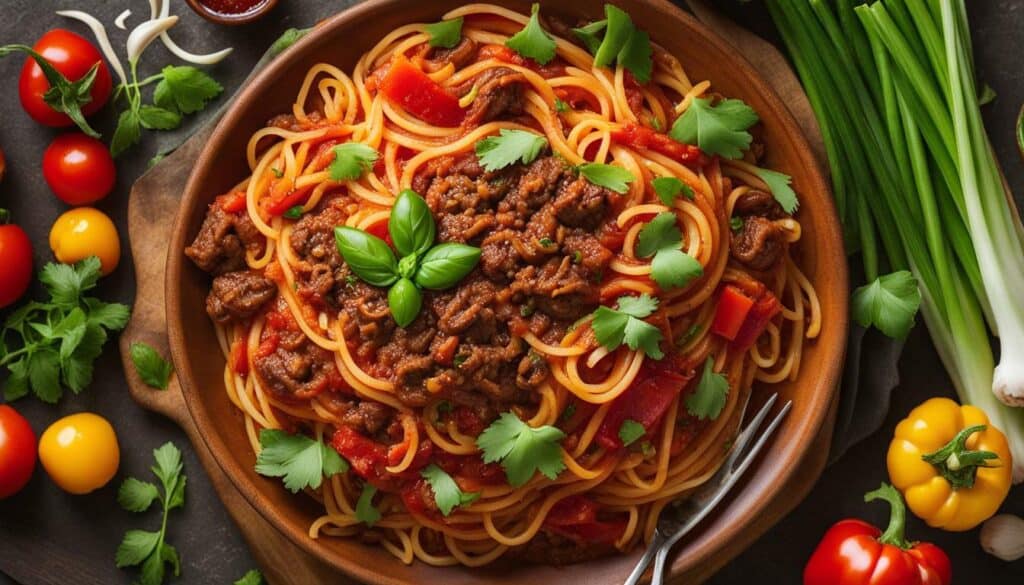
| Nutrient | Amount per Serving |
|---|---|
| Calories | 270 |
| Total Fat | 6g |
| Saturated Fat | 1g |
| Cholesterol | 5mg |
| Sodium | 640mg |
| Total Carbohydrates | 45g |
| Dietary Fiber | 4g |
| Total Sugars | 6g |
| Protein | 9g |
As you can see, spaghetti meat sauce can be a nutritious and satisfying choice for your next meal. Just remember to make mindful choices when selecting ingredients and practice portion control to maintain a well-rounded diet.
Understanding Spaghetti Meat Sauce Nutrition Facts
Before we dive into the specifics, let’s take a look at the general nutritional information of spaghetti meat sauce, including its calorie content and other essential nutrients. Spaghetti meat sauce is a popular dish enjoyed by many, but its nutritional composition can vary depending on the ingredients used and portion sizes.
The calorie content of spaghetti meat sauce can range from moderate to high, depending on the recipe. A specific spaghetti meat sauce package, for example, contains 270 calories per serving. In addition to calories, it’s important to consider other macronutrients such as fat, carbohydrates, and protein. This particular package has 6g of total fat, 1g of saturated fat, and 9g of protein.
When it comes to carbohydrates, spaghetti meat sauce can provide a substantial amount of energy. The same package mentioned earlier contains 45g of total carbohydrates, with 4g coming from dietary fiber and 6g from total sugars (including 3g of added sugars). It’s worth noting that the overall nutritional profile can be influenced by the type and amount of pasta used as well.
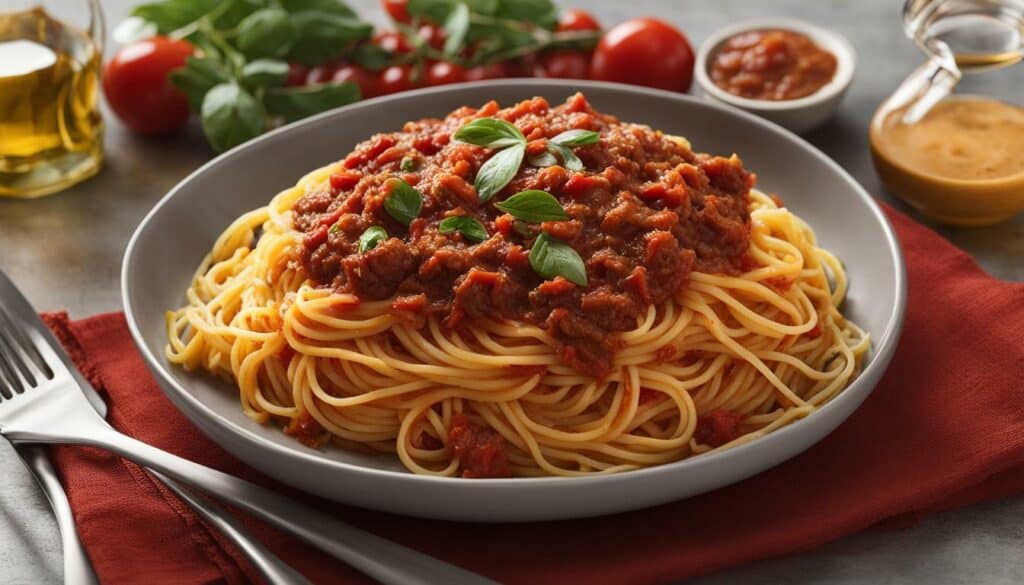
It’s important to note that the aforementioned nutrition facts are specific to this particular spaghetti meat sauce package. If you’re making homemade spaghetti meat sauce or using a different brand, the nutritional content may differ. Additionally, remember that the nutritional composition can vary based on the portion size and any additional ingredients you incorporate into your sauce.
Now that we have a better understanding of the general nutritional information of spaghetti meat sauce, we can delve deeper into the health benefits and ways to customize its nutritional content to suit your needs and preferences.
The Nutritional Breakdown of a Specific Spaghetti Meat Sauce Package
Let’s analyze the nutrition facts of a specific brand of spaghetti meat sauce, which will give you a better understanding of the calorie count, fat content, sodium levels, and other key nutrients.
When it comes to this particular spaghetti meat sauce, a serving size of 1/2 cup (124g) contains 270 calories. The total fat is 6g, with 1g being saturated fat. You’ll find 5mg of cholesterol and 640mg of sodium in each serving. In terms of carbohydrates, there are 45g, with 4g of dietary fiber. The sauce contains 6g of total sugars, including 3g of added sugars, and 9g of protein.
| Nutrient | Amount per Serving |
|---|---|
| Calories | 270 |
| Total Fat | 6g |
| Saturated Fat | 1g |
| Cholesterol | 5mg |
| Sodium | 640mg |
| Total Carbohydrates | 45g |
| Dietary Fiber | 4g |
| Total Sugars | 6g |
| Protein | 9g |
As you can see, this spaghetti meat sauce provides a substantial amount of calories, with moderate levels of fat and sodium. However, it also offers a good amount of dietary fiber and protein, making it a satisfying addition to your pasta dish. Remember to pay attention to portion sizes and consider the overall nutritional balance of your meal.
The Nutritional Profile of Cooked Spaghetti
While the meat sauce steals the spotlight, it’s essential to consider the nutritional profile of the spaghetti itself, as it plays a significant role in the overall healthfulness of the dish. Cooked spaghetti, made from refined durum wheat flour, is a versatile pasta that provides a good source of complex carbohydrates. One cup (140g) of cooked spaghetti without added salt, fat, or toppings contains approximately 221 calories. It is low in fat, with only 1.3g per serving, making it a lighter choice for those watching their fat intake.
When it comes to carbohydrates, cooked spaghetti offers about 43.2g per cup, providing a steady release of energy. The pasta also contains 2.5g of fiber, aiding in digestion and promoting feelings of fullness. With a glycemic load of only around 10, cooked spaghetti is considered to have a low impact on blood sugar levels, making it suitable for individuals with diabetes or those who are conscious of their carbohydrate intake.
In terms of micronutrients, cooked spaghetti provides essential vitamins and minerals. It contains approximately 1.01mg of iron, which is essential for transporting oxygen throughout the body. Additionally, it offers 115mcg of folate, a B-vitamin important for cell growth and development, as well as 0.42mcg of thiamin, which plays a role in energy metabolism. Including cooked spaghetti as part of a varied and balanced diet can contribute to meeting these nutritional needs.
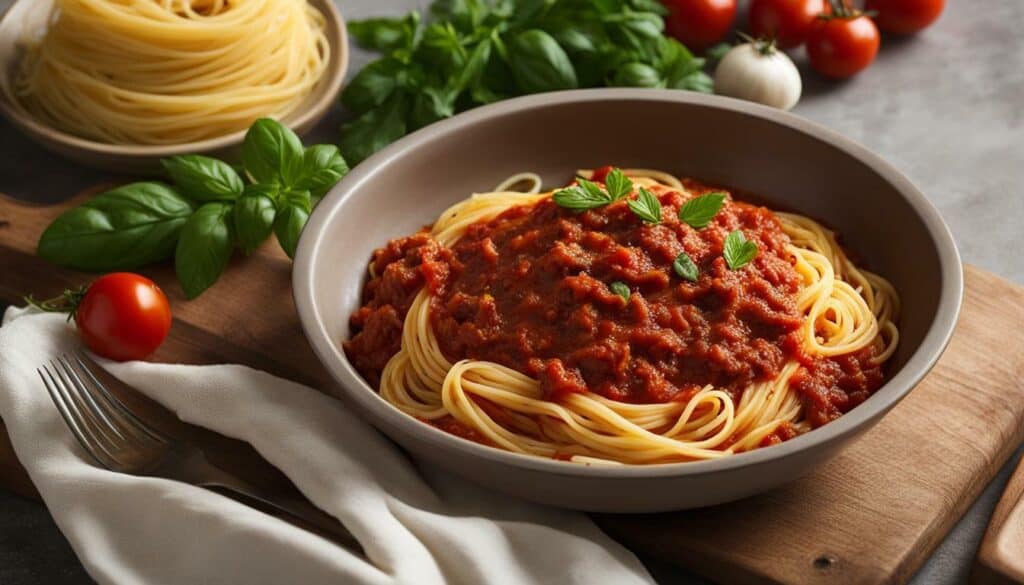
As I mentioned earlier, the nutritional profile of spaghetti meat sauce can vary depending on the specific recipe and portion size. Combining cooked spaghetti with a sauce that includes lean ground meat, vegetables, and herbs can make for a satisfying and nutritious meal. By being mindful of the ingredients and portion sizes, it’s possible to create a low-calorie spaghetti meat sauce that is packed with flavor and essential nutrients. Paying attention to the nutritional value of both the meat sauce and the spaghetti ensures a well-rounded and healthy dish that can be enjoyed as part of a balanced diet.
| Nutrient | Amount per Serving (1 cup, 140g) |
|---|---|
| Calories | 221 |
| Fat | 1.3g |
| Sodium | 1mg |
| Carbohydrates | 43.2g |
| Fiber | 2.5g |
| Sugars | 0.8g |
| Protein | 8.1g |
| Iron | 1.01mg |
| Folate | 115mcg |
| Thiamin | 0.42mcg |
Customizing Your Spaghetti Meat Sauce Nutrition
Making your own spaghetti meat sauce gives you the freedom to control the ingredients and tailor the nutrition to your specific dietary needs and preferences. Whether you’re looking to reduce calories, sodium, or add more nutrients, there are several ways to customize your homemade sauce.
One option is to choose leaner meats such as ground turkey or chicken instead of traditional ground beef. These alternatives are lower in fat and can help reduce the overall calorie content of your sauce. Additionally, you can add plenty of vegetables like onions, bell peppers, and mushrooms to increase the fiber and micronutrient content.
If you’re concerned about sodium intake, you can use low-sodium canned tomatoes or tomato puree as the base for your sauce. This allows you to control the amount of salt added. You can also experiment with herbs and spices to enhance the flavor without relying on excessive salt.
Customizable Ingredient Options:
- Lean meats like ground turkey or chicken
- Abundant vegetables such as onions, bell peppers, and mushrooms
- Low-sodium canned tomatoes or tomato puree
- Herbs and spices for added flavor
Another way to customize your spaghetti meat sauce is by choosing whole wheat or alternative pasta options. Whole wheat pasta is higher in fiber and provides a steady release of energy compared to refined white pasta. Alternatively, you can try gluten-free pasta or even spiralized zucchini noodles for a low-carb option.
Remember that portion sizes also play a crucial role in customizing your sauce’s nutrition. Be mindful of the amount of pasta and sauce you serve, and consider adding a side of salad or steamed vegetables to create a well-rounded meal.
By taking control of your spaghetti meat sauce recipe, you can create a nutritious and delicious meal that suits your individual needs. Experiment with different ingredients and flavors to find the perfect balance that satisfies your taste buds and supports your health goals.
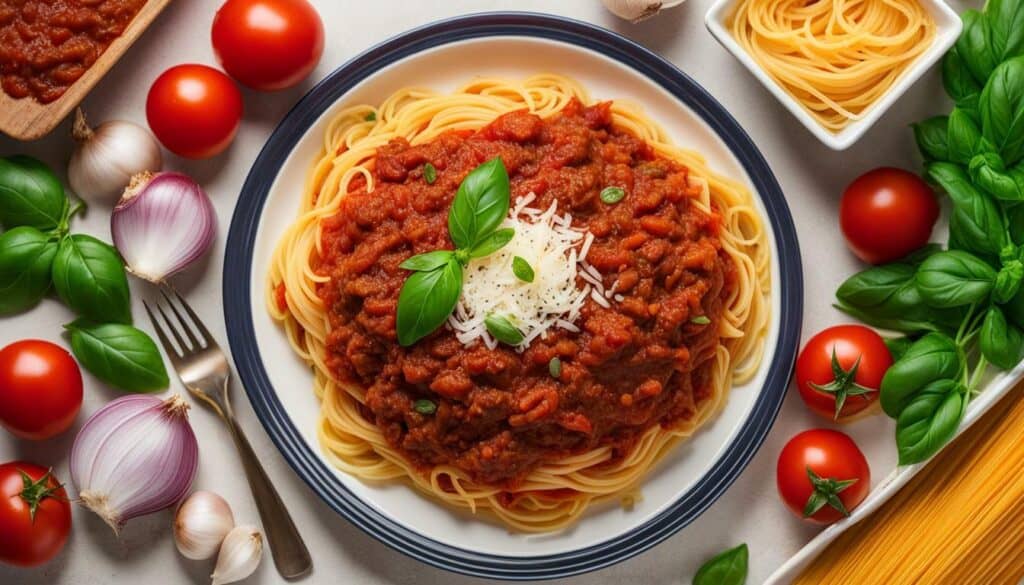
| Nutrient | Amount per serving |
|---|---|
| Calories | 270 |
| Total Fat | 6g |
| Saturated Fat | 1g |
| Cholesterol | 5mg |
| Sodium | 640mg |
| Total Carbohydrates | 45g |
| Dietary Fiber | 4g |
| Total Sugars | 6g |
| Added Sugars | 3g |
| Protein | 9g |
Generating Nutrition Information for Your Spaghetti Meat Sauce
If you’re curious about the nutrition content of your homemade spaghetti meat sauce recipe, you can use various tools or methods to generate a comprehensive overview of its nutritional value. One popular method is to use online nutrition calculators or apps specifically designed for recipe analysis. These tools allow you to input the ingredients and quantities used in your recipe, and they will calculate the nutritional information for you.
Another option is to consult reliable sources of nutritional information for individual ingredients. By adding up the nutritional values of all the ingredients used in your spaghetti meat sauce, you can get an approximate estimation of its overall nutrition content. Make sure to refer to trusted sources such as nutrition databases or reputable food labels.
If you prefer a more accurate analysis, you can send a sample of your homemade spaghetti meat sauce to a laboratory for testing. This method is more time-consuming and costly but provides the most precise nutritional information.
Remember, the nutritional content of your homemade spaghetti meat sauce may vary depending on the specific ingredients and portion sizes used. It’s important to keep track of the quantities and quality of each ingredient to ensure you get an accurate representation of the overall nutrition profile.
To give you a better idea, here is a table showing the nutrition facts for a specific brand of spaghetti meat sauce:
| Nutrient | Amount per Serving |
|---|---|
| Calories | 270 |
| Total Fat | 6g |
| Saturated Fat | 1g |
| Cholesterol | 5mg |
| Sodium | 640mg |
| Total Carbohydrates | 45g |
| Dietary Fiber | 4g |
| Total Sugars | 6g |
| Protein | 9g |
Sources:
– Nutrition Facts for a specific brand of spaghetti meat sauce package.
– General nutritional information for cooked spaghetti without added salt, fat, or toppings.
– Diet Generator tool to generate nutrition information for homemade spaghetti meat sauce recipes.
By utilizing these tools and methods, you can gain valuable insights into the nutritional value of your homemade spaghetti meat sauce. This information can help you make informed choices and adjustments to your recipe, ensuring a healthier and more balanced meal. Experiment with different ingredients and portion sizes to customize your spaghetti meat sauce to meet your specific nutritional needs and preferences. Enjoy your tasty and nutritious homemade creation!
If you’re aiming for a healthier version of spaghetti meat sauce, consider these tips and recommendations to reduce calories, limit fat intake, and increase nutritional value.
1. Choose lean meats: Opt for lean ground beef or turkey instead of high-fat options like sausage or fatty cuts of beef. This will help reduce the overall fat content of your sauce while still adding flavor and protein.
2. Load up on vegetables: Add a variety of vegetables to your sauce, such as bell peppers, onions, mushrooms, and zucchini. Not only will this boost the nutritional value of your spaghetti meat sauce, but it will also add volume and fiber, helping you feel fuller for longer.
3. Control portion sizes: Pay attention to your portion sizes when serving spaghetti meat sauce. Stick to recommended serving sizes to avoid overeating and consuming excess calories.
| Ingredient | Calories per Serving | Total Fat (g) | Saturated Fat (g) | Sodium (mg) | Carbohydrates (g) | Protein (g) |
|---|---|---|---|---|---|---|
| Lean Ground Beef (3 oz) | 204 | 13.5 | 5.3 | 59 | 0 | 19.7 |
| Turkey (3 oz) | 135 | 2.5 | 0.7 | 56 | 0 | 26.2 |
| Bell Peppers (1 medium) | 24 | 0.3 | 0.1 | 2 | 6 | 0.9 |
| Mushrooms (1 cup, sliced) | 15 | 0.2 | 0 | 2 | 2.3 | 2.2 |
| Zucchini (1 medium) | 33 | 0.6 | 0.2 | 9 | 6 | 2.4 |
4. Use whole grain pasta: Swap regular pasta for whole grain options to increase fiber content and make your spaghetti meat sauce more filling.
5. Limit added sugars: Be mindful of added sugars in your sauce. Instead of using sugar, experiment with natural sweeteners like grated carrots or a splash of balsamic vinegar to enhance the flavors without adding extra sugar.
6. Season with herbs and spices: Instead of relying heavily on salt, enhance the taste of your spaghetti meat sauce with a variety of herbs and spices. This will add flavor without increasing sodium intake.
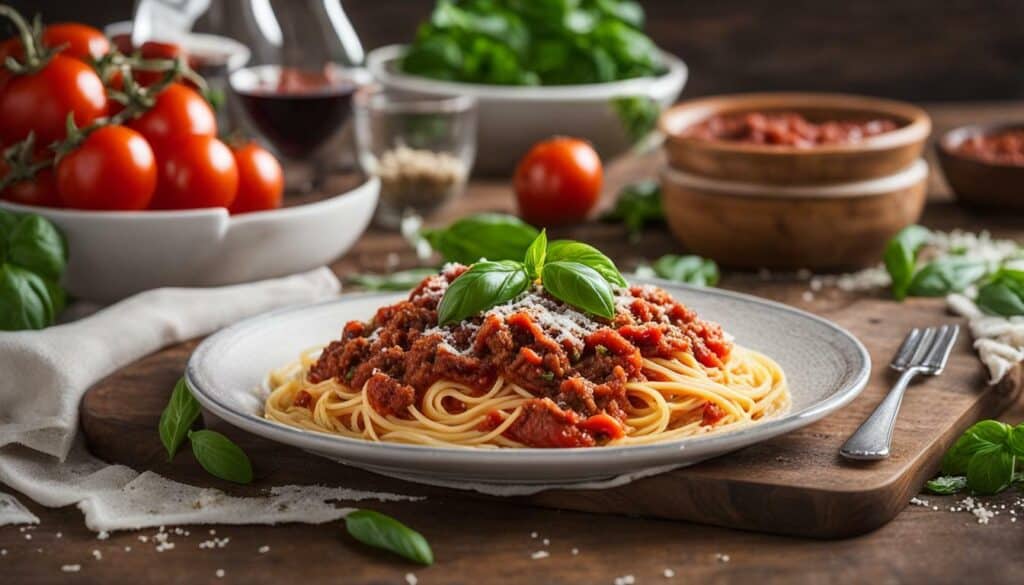
Remember that these recommendations are just starting points, and you can adjust them based on your personal preferences and dietary needs. By making small changes and being mindful of your ingredient choices, you can enjoy a healthier version of spaghetti meat sauce without sacrificing flavor or satisfaction.
Conclusion
Spaghetti meat sauce, when prepared and consumed mindfully, can be a delicious and nutritious addition to your diet. By understanding its nutritional profile and customizing the recipe to suit your needs, you can enjoy this beloved dish while maintaining a healthy lifestyle.
When it comes to spaghetti meat sauce, the nutritional value can vary depending on the ingredients used. It’s important to be aware of the specific nutrition facts, especially if you’re following a specific diet or have dietary restrictions. The information provided for a specific spaghetti meat sauce package shows that it contains 270 calories per serving, with 6g of total fat, 1g of saturated fat, and 640mg of sodium.
Additionally, the general information about spaghetti nutrition reveals that one cup (140g) of cooked spaghetti without added salt, fat, or toppings contains 221 calories, 1.3g of fat, and 1mg of sodium. It is a low-fat food, a good source of complex carbohydrates, and contains some iron.
If you’re interested in specific nutrition facts for your homemade spaghetti meat sauce, you can generate the information using tools like the Diet Generator. This allows you to customize the nutritional content of your dish, tailoring it to your specific tastes and dietary needs.
Overall, spaghetti meat sauce can be a moderate calorie dish with varying levels of fat, sodium, carbohydrates, fiber, sugars, protein, and vitamins/minerals, depending on the specific recipe and portion size. By being mindful of the ingredients you use and portion sizes, you can enjoy this classic Italian dish without compromising your health goals.
FAQ
Q: What are the nutrition facts of spaghetti meat sauce?
A: The nutrition facts of spaghetti meat sauce can vary depending on the recipe, but a specific package of spaghetti meat sauce contains approximately 270 calories per serving. It has 6g of total fat, 1g of saturated fat, 5mg of cholesterol, 640mg of sodium, 45g of total carbohydrates, 4g of dietary fiber, 6g of total sugars (including 3g of added sugars), and 9g of protein.
Q: How healthy is spaghetti meat sauce?
A: Spaghetti meat sauce can be a healthy option as it is a good source of protein, carbohydrates, and dietary fiber. However, the overall healthiness depends on the specific ingredients and the portion size used in the recipe.
Q: What is the nutritional profile of cooked spaghetti?
A: One cup (140g) of cooked spaghetti without added salt, fat, or toppings contains 221 calories, 1.3g of fat, 1mg of sodium, 43.2g of carbohydrates, 2.5g of fiber, 0.8g of sugars, 8.1g of protein, 1.01mg of iron, 115mcg of folate, and 0.42mcg of thiamin. It is a low-fat food, a good source of complex carbohydrates, has a low glycemic load, and contains some iron.
Q: How can I customize the nutrition of my spaghetti meat sauce?
A: Homemade spaghetti meat sauce allows for customization of its nutritional content. You can choose lean meat, reduce added sugars, use whole grain pasta, increase vegetable content, and adjust the portion size to make it healthier and align with your nutritional goals.
Q: Is there a way to generate nutrition information for my homemade spaghetti meat sauce?
A: Yes, you can use tools like Diet Generator to generate nutrition information for your homemade spaghetti meat sauce. This allows you to accurately track the nutritional content of your recipe.
Q: How can I make a healthier spaghetti meat sauce?
A: To make a healthier spaghetti meat sauce, you can use lean ground meat, reduce the amount of added fats, opt for whole grain pasta, increase vegetable content, reduce added sugars, and control portion sizes.
Can Main Ingredient Menu Help Me Find Nutritional Information for Other Dishes?
Can the main ingredient menu help me find nutritional information for other dishes? Whether you’re curious about calories, fat content, or allergens in your new favorite dish, the main ingredient menu is a valuable resource. It provides a comprehensive overview of the nutritional information for various dishes, making it easier for you to make informed choices.

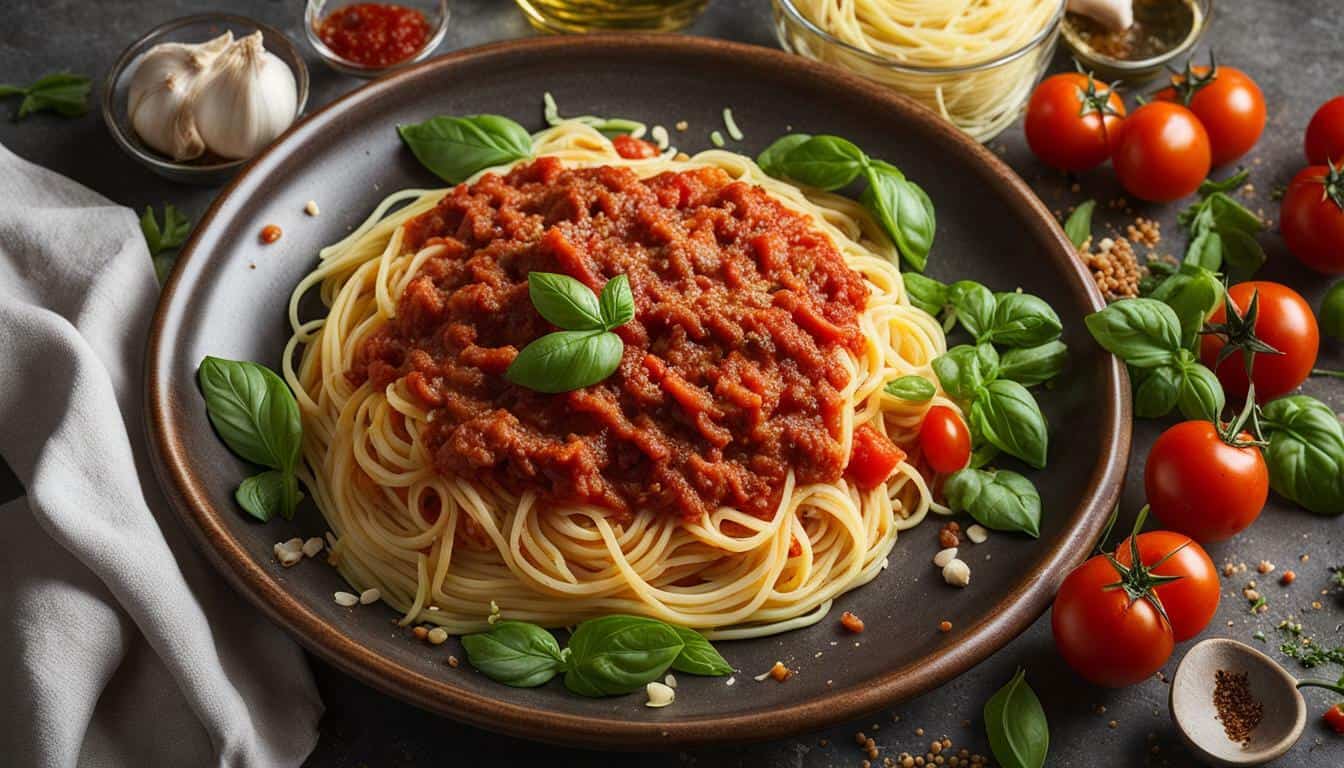



Leave a Reply